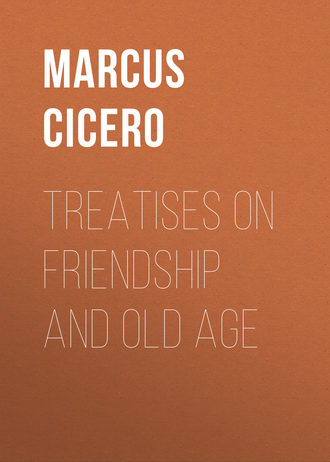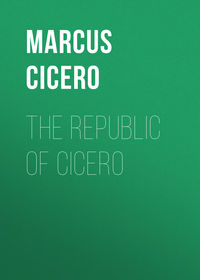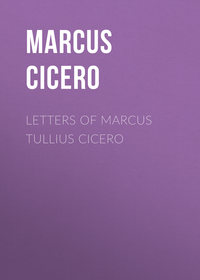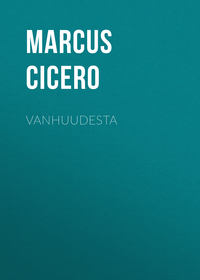 полная версия
полная версияTreatises on Friendship and Old Age
5. What then is the purpose of such a long disquisition on Maximus? It is because you now see that an old age like his cannot conscientiously be called unhappy. Yet it is after all true that everybody cannot be a Scipio or a Maximus, with stormings of cities, with battles by land and sea, with wars in which they themselves commanded, and with triumphs to recall. Besides this there is a quiet, pure, and cultivated life which produces a calm and gentle old age, such as we have been told Plato's was, who died at his writing-desk in his eighty-first year; or like that of Isocrates, who says that he wrote the book called The Panegyric in his ninety-fourth year, and who lived for five years afterwards; while his master Gorgias of Leontini completed a hundred and seven years without ever relaxing his diligence or giving up work. When some one asked him why he consented to remain so long alive—"I have no fault," said he, "to find with old age." That was a noble answer, and worthy of a scholar. For fools impute their own frailties and guilt to old age, contrary to the practice of Ennui, whom I mentioned just now. In the lines—
Like some brave steed that oft before The Olympic wreath of victory bore, Now by the weight of years oppressed, Forgets the race, and takes his rest—he compares his own old age to that of a high-spirited and successful race-horse. And him indeed you may very well remember. For the present consuls Titus Flamininus and Manius Acilius were elected in the nineteenth year after his death; and his death occurred in the consulship of Caepio and Philippus, the latter consul for the second time: in which year I, then sixty-six years old, spoke in favour of the Voconian law in a voice that was still strong and with lungs still sound; while be, though seventy years old, supported two burdens considered the heaviest of all—poverty and old age—in such a way as to be all but fond of them.
The fact is that when I come to think it over, I find that there are four reasons for old age being thought unhappy: First, that it withdraws us from active employments; second, that it enfeebles the body; third, that it deprives us of nearly all physical pleasures; fourth, that it is the next step to death. Of each of these reasons, if you will allow me, let us examine the force and justice separately.
6. OLD AGE WITHDRAWS US FROM ACTIVE EMPLOYMENTS. From which of them? Do you mean from those carried on by youth and bodily strength? Are there then no old men's employments to be after all conducted by the intellect, even when bodies are weak? So then Q. Maximus did nothing; nor L. Aemilius—our father, Scipio, and my excellent son's father-in-law! So with other old men—the Fabricii, the Guru and Coruncanii—when they were supporting the State by their advice and influence, they were doing nothing! To old age Appius Claudius had the additional disadvantage of being blind; yet it was he who, when the Senate was inclining towards a peace with Pyrrhus and was for making a treaty, did not hesitate to say what Ennius has embalmed in the verses:
Whither have swerved the souls so firm of yore? Is sense grown senseless? Can feet stand no more?And so on in a tone of the most passionate vehemence. You know the poem, and the speech of Appius himself is extant. Now, he delivered it seventeen years after his second consulship, there having been an interval of ten years between the two consulships, and he having been censor before his previous consulship. This will show you that at the time of the war with Pyrrhus he was a very old man. Yet this is the story handed down to us.
There is therefore nothing in the arguments of those who say that old age takes no part in public business. They are like men who would say that a steersman does nothing in sailing a ship, because, while some of the crew are climbing the masts, others hurrying up and down the gangways, others pumping out the bilge water, he sits quietly in the stern holding the tiller. He does not do what young men do; nevertheless he does what is much more important and better. The great affairs of life are not performed by physical strength, or activity, or nimbleness of body, but by deliberation, character, expression of opinion. Of these old age is not only not deprived, but, as a rule, has them in a greater degree. Unless by any chance I, who as a soldier in the ranks, as military tribune, as legate, and as consul have been employed in various kinds of war, now appear to you to be idle because not actively engaged in war. But I enjoin upon the Senate what is to be done, and how. Carthage has long been harbouring evil designs, and I accordingly proclaim war against her in good time. I shall never cease to entertain fears about her till I bear of her having been levelled with the ground. The glory of doing that I pray that the immortal gods may reserve for you, Scipio, so that you may complete the task begun by your grand-father, now dead more than thirty-two years ago; though all years to come will keep that great man's memory green. He died in the year before my censorship, nine years after my consulship, having been returned consul for the second time in my own consulship. If then he had lived to his hundredth year, would he have regretted having lived to be old? For he would of course not have been practising rapid marches, nor dashing on a foe, nor hurling spears from a distance, nor using swords at close quarters—but only counsel, reason, and senatorial eloquence. And if those qualities had not resided in us seniors, our ancestors would never have called their supreme council a Senate. At Sparta, indeed, those who hold the highest magistracies are in accordance with the fact actually called "elders." But if you will take the trouble to read or listen to foreign history, you will find that the mightiest States have been brought into peril by young men, have been supported and restored by old. The question occurs in the poet Naevius's Sport:
Pray, who are those who brought your State With such despatch to meet its fate?There is a long answer, but this is the chief point:
A crop of brand-new orators we grew, And foolish, paltry lads who thought they knew.For of course rashness is the note of youth, prudence of old age.
7. But, it is said, memory dwindles. No doubt, unless you keep it in practice, or if you happen to be somewhat dull by nature. Themistocles had the names of all his fellow-citizens by heart. Do you imagine that in his old age he used to address Aristides as Lysimachus? For my part, I know not only the present generation, but their fathers also, and their grandfathers. Nor have I any fear of losing my memory by reading tombstones, according to the vulgar superstition. On the contrary, by reading them I renew my memory of those who are dead and gone. Nor, in point of fact, have I ever heard of any old man forgetting where he had hidden his money. They remember everything that interests them: when to answer to their bail, business appointments, who owes them money, and to whom they owe it. What about lawyers, pontiffs, augurs, philosophers, when old? What a multitude of things they remember! Old men retain their intellects well enough, if only they keep their minds active and fully employed. Nor is that the case only with men of high position and great office: it applies equally to private life and peaceful pursuits. Sophocles composed tragedies to extreme old age; and being believed to neglect the care of his property owing to his devotion to his art, his sons brought him into court to get a judicial decision depriving him of the management of his property on the ground of weak intellect—just as in our law it is customary to deprive a paterfamilias of the management of his property if he is squandering it. There—upon the old poet is said to have read to the judges the play he had on hand and had just composed—the Oedipus Coloneus—and to have asked them whether they thought that the work of a man of weak intellect. After the reading he was acquitted by the jury. Did old age then compel this man to become silent in his particular art, or Homer, Hesiod, Simonides, or Isocrates and Gorgias whom I mentioned before, or the founders of schools of philosophy, Pythagoras, Democritus, Plato, Xenocrates, or later Zeno and Cleanthus, or Diogenes the Stoic, whom you too saw at Rome? Is it not rather the case with all these that the active pursuit of study only ended with life?
But, to pass over these sublime studies, I can name some rustic Romans from the Sabine district, neighbours and friends of my own, without whose presence farm work of importance is scarcely ever performed—whether sowing, or harvesting or storing crops. And yet in other things this is less surprising; for no one is so old as to think that he may not live a year. But they bestow their labour on what they know does not affect them in any case:
He plants his trees to serve a race to come,as our poet Statius says in his Comrades. Nor indeed would a farmer, however old, hesitate to answer any one who asked him for whom he was planting: "For the immortal gods, whose will it was that I should not merely receive these things from my ancestors, but should also hand them on to the next generation."
8. That remark about the old man is better than the following:
If age brought nothing worse than this, It were enough to mar our bliss, That he who bides for many years Sees much to shun and much for tears.Yes, and perhaps much that gives him pleasure too. Besides, as to subjects for tears, he often comes upon them in youth as well.
A still more questionable sentiment in the same Caecilius is:
No greater misery can of age be told Than this: be sure, the young dislike the old.Delight in them is nearer the mark than dislike. For just as old men, if they are wise, take pleasure in the society of young men of good parts, and as old age is rendered less dreary for those who are courted and liked by the youth, so also do young men find pleasure in the maxims of the old, by which they are drawn to the pursuit of excellence. Nor do I perceive that you find my society less pleasant than I do yours. But this is enough to show you how, so far from being listless and sluggish, old age is even a busy time, always doing and attempting something, of course of the same nature as each man's taste had been in the previous part of his life. Nay, do not some even add to their stock of learning? We see Solon, for instance, boasting in his poems that he grows old "daily learning something new." Or again in my own case, it was only when an old man that I became acquainted with Greek literature, which in fact I absorbed with such avidity—in my yearning to quench, as it were, a long-continued thirst—that I became acquainted with the very facts which you see me now using as precedents. When I heard what Socrates had done about the lyre I should have liked for my part to have done that too, for the ancients used to learn the lyre but, at any rate, I worked hard at literature.
9. Nor, again, do I now MISS THE BODILY STRENGTH OF A YOUNG MAN (for that was the second point as to the disadvantages of old age) any more than as a young man I missed the strength of a bull or an elephant. You should use what you have, and whatever you may chance to be doing, do it with all your might. What could be weaker than Milo of Croton's exclamation? When in his old age he was watching some athletes practising in the course, he is said to have looked at his arms and to have exclaimed with tears in his eyes: "Ah well! these are now as good as dead." Not a bit more so than yourself, you trifler! For at no time were you made famous by your real self, but by chest and biceps. Sext. Aelius never gave vent to such a remark, nor, many years before him, Titus Coruncanius, nor, more recently, P. Crassus—all of them learned juris-consults in active practice, whose knowledge of their profession was maintained to their last breath. I am afraid an orator does lose vigour by old age, for his art is not a matter of the intellect alone, but of lungs and bodily strength. Though as a rule that musical ring in the voice even gains in brilliance in a certain way as one grows old—certainly I have not yet lost it, and you see my years. Yet after all the style of speech suitable to an old man is the quiet and unemotional, and it often happens that the chastened and calm delivery of an old man eloquent secures a hearing. If you cannot attain to that yourself, you might still instruct a Scipio and a Laelius. For what is more charming than old age surrounded by the enthusiasm of youth? Shall we not allow old age even the strength to teach the young, to train and equip them for all the duties of life? And what can be a nobler employment? For my part, I used to think Publius and Gnaeus Scipio and your two grandfathers, L. Aemilius and P. Africanus, fortunate men when I saw them with a company of young nobles about them. Nor should we think any teachers of the fine arts otherwise than happy, however much their bodily forces may have decayed and failed. And yet that same failure of the bodily forces is more often brought about by the vices of youth than of old age; for a dissolute and intemperate youth hands down the body to old age in a worn-out state. Xenophon's Cyrus, for instance, in his discourse delivered on his death-bed and at a very advanced age, says that he never perceived his old age to have become weaker than his youth had been. I remember as a boy Lucius Metellus, who having been created Pontifex Maximus four years after his second consulship, held that office twenty-two years, enjoying such excellent strength of body in the very last hours of his life as not to miss his youth. I need not speak of myself; though that indeed is an old man's way and is generally allowed to my time of life. Don't you see in Homer how frequently Nestor talks of his own good qualities? For he was living through a third generation; nor had he any reason to fear that upon saying what was true about himself he should appear either over vain or talkative. For, as Homer says, "from his lips flowed discourse sweeter than honey," for which sweet breath he wanted no bodily strength. And yet, after all, the famous leader of the Greeks nowhere wishes to have ten men like Ajax, but like Nestor: if he could get them, he feels no doubt of Troy shortly falling.
10. But to return to my own case: I am in my eighty-fourth year. I could wish that I had been able to make the same boast as Cyrus; but, after all, I can say this: I am not indeed as vigorous as I was as a private soldier in the Punic war, or as quaestor in the same war, or as consul in Spain, and four years later when as a military tribune I took part in the engagement at Thermopylae under the consul Manius Acilius Glabrio; but yet, as you see, old age has not entirely destroyed my muscles, has not quite brought me to the ground. The Senate-house does not find all my vigour gone, nor the rostra, nor my friends, nor my clients, nor my foreign guests. For I have never given in to that ancient and much-praised proverb:
Old when young Is old for long.For myself, I had rather be an old man a somewhat shorter time than an old man before my time. Accordingly, no one up to the present has wished to see me, to whom I have been denied as engaged. But, it may be said, I have less strength than either of you. Neither have you the strength of the centurion T. Pontius: is he the more eminent man on that account? Let there be only a proper husbanding of strength, and let each man proportion his efforts to his powers. Such an one will assuredly not be possessed with any great regret for his loss of strength. At Olympia Milo is said to have stepped into the course carrying a live ox on his shoulders. Which then of the two would you prefer to have given to you—bodily strength like that, or intellectual strength like that of Pythagoras? In fine, enjoy that blessing when you have it; when it is gone, don't wish it back—unless we are to think that young men should wish their childhood back, and those somewhat older their youth! The course of life is fixed, and nature admits of its being run but in one way, and only once; and to each part of our life there is something specially seasonable; so that the feebleness of children, as well as the high spirit of youth, the soberness of maturer years, and the ripe wisdom of old age—all have a certain natural advantage which should be secured in its proper season. I think you are informed, Scipio, what your grandfather's foreign friend Masinissa does to this day, though ninety years old. When he has once begun a journey on foot he does not mount his horse at all; when on horseback he never gets off his horse. By no rain or cold can he be induced to cover his head. His body is absolutely free from unhealthy humours, and so he still performs all the duties and functions of a king. Active exercise, therefore, and temperance can preserve some part of one's former strength even in old age.
11. Bodily strength is wanting to old age; but neither is bodily strength demanded from old men. Therefore, both by law and custom, men of my time of life are exempt from those duties which cannot be supported without bodily strength. Accordingly not only are we not forced to do what we cannot do; we are not even obliged to do as much as we can. But, it will be said, many old men are so feeble that they cannot perform any duty in life of any sort or kind. That is not a weakness to be set down as peculiar to old age: it is one shared by ill health. How feeble was the son of P. Africanus, who adopted you! What weak health he had, or rather no health at all! If that had not been the case, we should have had in him a second brilliant light in the political horizon; for he had added a wider cultivation to his father's greatness of spirit. What wonder, then, that old men are eventually feeble, when even young men cannot escape it? My dear Laelius and Scipio, we must stand up against old age and make up for its drawbacks by taking pains. We must fight it as we should an illness. We must look after our health, use moderate exercise, take just enough food and drink to recruit, but not to overload, our strength. Nor is it the body alone that must be supported, but the intellect and soul much more. For they are like lamps: unless you feed them with oil, they too go out from old age. Again, the body is apt to get gross from exercise; but the intellect becomes nimbler by exercising itself. For what Caecilius means by "old dotards of the comic stage" are the credulous, the forgetful, and the slipshod. These are faults that do not attach to old age as such, but to a sluggish, spiritless, and sleepy old age. Young men are more frequently wanton and dissolute than old men; but yet, as it is not all young men that are so, but the bad set among them, even so senile folly—usually called imbecility—applies to old men of unsound character, not to all. Appius governed four sturdy sons, five daughters, that great establishment, and all those clients, though he was both old and blind. For he kept his mind at full stretch like a how, and never gave in to old age by growing slack. He maintained not merely an influence, but an absolute command over his family: his slaves feared him, his sons were in awe of him, all loved him. In that family, indeed, ancestral custom and discipline were in full vigour. The fact is that old age is respectable just as long as it asserts itself, maintains its proper rights, and is not enslaved to any one. For as I admire a young man who has something of the old man in him, so do I an old one who has something of a young man. The man who aims at this may possibly become old in body—in mind he never will. I am now engaged in composing the seventh book of my Origins. I collect all the records of antiquity. The speeches delivered in all the celebrated cases which I have defended I am at this particular time getting into shape for publication. I am writing treatises on augural, pontifical, and civil law. I am, besides, studying hard at Greek, and after the manner of the Pythagoreans—to keep my memory in working order—I repeat in the evening whatever I have said, heard, or done in the course of each day. These are the exercises of the intellect, these the training grounds of the mind: while I sweat and labour on these I don't much feel the loss of bodily strength. I appear in court for my friends; I frequently attend the Senate and bring motions before it on my own responsibility, prepared after deep and long reflection. And these I support by my intellectual, not my bodily forces. And if I were not strong enough to do these things, yet I should enjoy my sofa—imagining the very operations which I was now unable to perform. But what makes me capable of doing this is my past life. For a man who is always living in the midst of these studies and labours does not perceive when old age creeps upon him. Thus, by slow and imperceptible degrees life draws to its end. There is no sudden breakage; it just slowly goes out.
12. The third charge against old age is that it LACKS SENSUAL PLEASURES. What a splendid service does old age render, if it takes from us the greatest blot of youth! Listen, my dear young friends, to a speech of Archytas of Tarentum, among the greatest and most illustrious of men, which was put into my hands when as a young man I was at Tarentum with Q. Maximus. "No more deadly curse than sensual pleasure has been inflicted on mankind by nature, to gratify which our wanton appetites are roused beyond all prudence or restraint. It is a fruitful source of treasons, revolutions, secret communications with the enemy. In fact, there is no crime, no evil deed, to which the appetite for sensual pleasures does not impel us. Fornications and adulteries, and every abomination of that kind, are brought about by the enticements of pleasure and by them alone. Intellect is the best gift of nature or God: to this divine gift and endowment there is nothing so inimical as pleasure. For when appetite is our master, there is no place for self-control; nor where pleasure reigns supreme can virtue hold its ground. To see this more vividly, imagine a man excited to the highest conceivable pitch of sensual pleasure. It can be doubtful to no one that such a person, so long as he is under the influence of such excitation of the senses, will be unable to use to any purpose either intellect, reason, or thought. Therefore nothing can be so execrable and so fatal as pleasure; since, when more than ordinarily violent and lasting, it darkens all the light of the soul."
These were the words addressed by Archytas to the Samnite Caius Pontius, father of the man by whom the consuls Spurius Postumius and Titus Veturius were beaten in the battle of Caudium. My friend Nearchus of Tarentum, who had remained loyal to Rome, told me that he had heard them repeated by some old men; and that Plato the Athenian was present, who visited Tarentum, I find, in the consulship of L. Camillus and Appius Claudius.
What is the point of all this? It is to show you that, if we were unable to scorn pleasure by the aid of reason and philosophy, we ought to have been very grateful to old age for depriving us of all inclination for that which it was wrong to do. For pleasure hinders thought, is a foe to reason, and, so to speak, blinds the eyes of the mind. It is, moreover, entirely alien to virtue. I was sorry to have to expel Lucius, brother of the gallant Titus Flamininus, from the Senate seven years after his consulship; but I thought it imperative to affix a stigma on an act of gross sensuality. For when he was in Gaul as consul, he had yielded to the entreaties of his paramour at a dinner-party to behead a man who happened to be in prison condemned on a capital charge. When his brother Titus was Censor, who preceded me, he escaped; but I and Flaccus could not countenance an act of such criminal and abandoned lust, especially as, besides the personal dishonour, it brought disgrace on the Government.
13. I have often been told by men older than myself, who said that they had heard it as boys from old men, that Gaius Fabricius was in the habit of expressing astonishment at having heard, when envoy at the headquarters of king Pyrrhus, from the Thessalian Cineas, that there was a man of Athens who professed to be a "philosopher," and affirmed that everything we did was to be referred to pleasure. When he told this to Manius Curius and Publius Decius, they used to remark that they wished that the Samnites and Pyrrhus himself would hold the same opinion. It would be much easier to conquer them, if they had once given themselves over to sensual indulgences. Manius Curius had been intimate with P. Decius, who four years before the former's consulship had devoted himself to death for the Republic. Both Fabricius and Coruncanius knew him also, and from the experience of their own lives, as well as from the action of P. Decius, they were of opinion that there did exist something intrinsically noble and great, which was sought for its own sake, and at which all the best men aimed, to the contempt and neglect of pleasure. Why then do I spend so many words on the subject of pleasure? Why, because, far from being a charge against old age, that it does not much feel the want of any pleasures, it is its highest praise.









